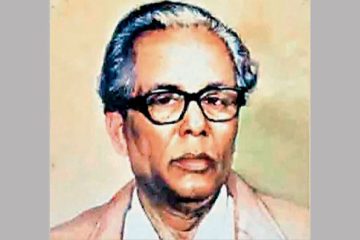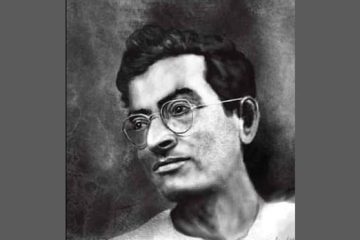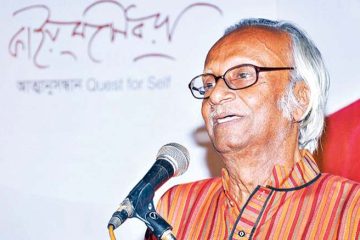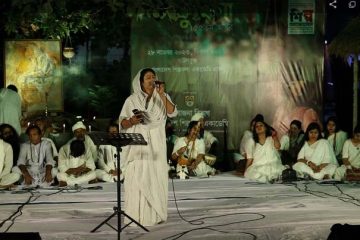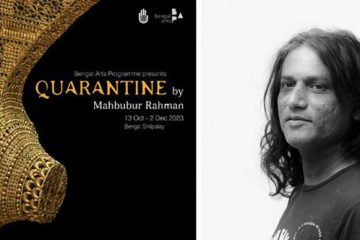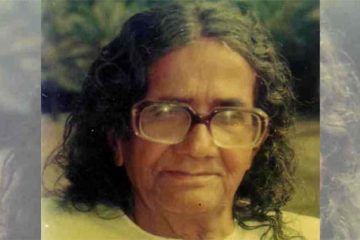 Cultural arena in the country deeply shocked at the death of renowned filmmaker Tareque Masud, who was among six killed in a road accident on the Dhaka-Aricha highway in Manikganj on Saturday morning while returning Dhaka from the shooting spot of his upcoming movie titled Kagojer Phool. A huge vacuum has been created in the film industry at his sudden death, observed leading actors, directors, film society activists and others. He was 54.
Cultural arena in the country deeply shocked at the death of renowned filmmaker Tareque Masud, who was among six killed in a road accident on the Dhaka-Aricha highway in Manikganj on Saturday morning while returning Dhaka from the shooting spot of his upcoming movie titled Kagojer Phool. A huge vacuum has been created in the film industry at his sudden death, observed leading actors, directors, film society activists and others. He was 54.
Tareque Masud was one of the leading Independent filmmakers in the country, who could create a strong alternative film movement in the country parallel to the mainstream movies known as Dhaliwood. Tareque Masud is credited with directing eight movies, most of which are co-directed by his wife Catherine Masud, who is also seriously injured at the accident.
He won many awards including the International Critics’ Prize and FIPRESCI Prize for Directors’ Fortnight at the 2002 Cannes Film Festival for the movie ‘Matir Moina’. This movie was the first one from Bangladesh to compete at foreign language movie category in the Oscars.
He is a founding member of the Short Film Forum, the primary forum for alternative filmmakers in Bangladesh, and in 1988 served as Coordinator of the First International Short Film Festival held in Dhaka. He has also attended international film festivals and seminars in Europe, North America and Asia.
Born in December 6, 1957, in Faridpur, Tareque Masud spent most of his childhood in a madrasah. In earlier interviews he told that the war of independence in 1971 put an abrupt end to his religious studies, and after the war he entered general education, eventually completing his masters in History from Dhaka University.
While studying at DU, he actively involved in the film society movement and participated in numerous short courses and workshops on film in Bangladesh and abroad. In fact, he dedicated everything for cinema and developing a vibrant film society movement.
‘As an independent filmmaker Masud was the most talented, innovative and organised person. In fact, he re-introduced Bangladeshi films in international arena,’ Masud’s close friend independent filmmaker and film movement activist Manzar-e Hasin Murad told New Age.
Tareque Masud started making his first film, a documentary titled ‘Adam Surat’ on the legendary painter SM Sultan, in 1982 and could complete it in 1989. However, Masud became popular for his documentary Muktir Gaan (The Song of Freedom, 1995) where camera follows a musical troupe during the war of independence in 1971. The film was made mainly based on the footage of American filmmaker Liar Levin that Masud got from the basement of Levin’s house in New York.
It was not the sole movie on the war by Masud. He also made Narir Katha and Muktir Katha on the same theme.
Labeling Masud the ‘most influential’ filmmaker in the post-war Bangladesh, cultural personality Nasiruddin Yousuff, president of Sammilito Sanskritik Jote, told New Age, ‘He delicately highlighted the spirit of the war of independence through his movies. At his death, the country has lost the most potential filmmaker of his age.’
‘His movies on the war of independence have archival values. He collected footages from US and Pakistan. He had very clear concept on cinema. Moreover, he was the frontrunner in the film society movement,’ commented film critique Anupam Hayat.
In 2002 Masud made his first feature film, Matir Moina (The Clay Bird), featuring Masud’s own experiences studying at a madrasah on the outskirt of the increasing tensions in the then East Pakistan, created controversy in the country but brought many international awards including FIPRESCI International Critics’ Prize for Best Film, 2002 Edinburgh International Film Festival, 2002 Montreal International Film Festival, 2002 Marrakech Film Festival (Morocco), Best Screen Play Award, 2002 Cairo International Film Festival, 2003 Palm Springs International Film Festival, 2003 New Directors/New Films Festival, 2003 Karafilm Festival, Best Film.
‘In fact, I achieved reputation as a film actor just because of acting in Masud’s movie,’ Rokeya Prachi, who acted in Matir Moina and Antorjatra, told New Age.
In fact, Tareque Masud as a filmmaker has also tried to give an insightful overview on madrasah education system and rise of fundamentalism in his latest movie Runway. After releasing the movie in last year, Masud took initiative to create a movement to save the movie theatres in the district towns from destruction by releasing his movies.
Masud was also very helpful and encouraging for the young filmmakers.
‘He was like my guide. I’ve lost my guardian,’ an emotional Mostafa Sarwar Farooki, told New Age.
Tareque Masud’s death is not only a loss to the local film industry. Rather his death may damage Bangladeshi movies’ international connection.
‘After Alamgir Kabir, Tareque Masud was the only leading independent Bangladeshi filmmaker who had very good international,’ said the International Federation of Film Critics (FIPRESCI) general secretary of the Bangladesh chapter, Ahmed Mustafa Zaman.
Tareque Masud’s death is great loss for Bangladesh, he observed.
-With New Age input
Related News
Tareque Masud, Mishuk Munier killed in road crash
Patriotism personified
Fate puts a full stop















